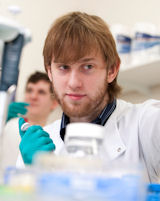You are here: Centre for Doctoral Training in Molecular-Scale Engineering > Our Students > Mark Sellick
Mark Sellick

Background
As an undergraduate, I studied for an MPhys in Theoretical Physics at the University of Leeds. My final year project was in the field of quantum optics, looking at electromagnetically induced transparency.
Since I was studying theoretical physics, I had very little lab experience before joining the CDT. In fact, part of what attracted me to the CDT was the opportunity to spend a lot of time in different labs, gaining skills and experience that I hadn't developed during my degree.
Research Interests
At the end of my degree, my research interests lay within quantum physics, and quantum optics in particular. However, working within the CDT has led me to become more interested in nanoscale physics. Specifically, I've developed an interest in the use of techniques from physics to detect biological markers and molecules.
This interest both informed and has been strengthened by my choice of project rotations. My first rotation was in the School of Physics in Leeds, working on making quantum dots suitable for use in medical imaging. My second rotation was in the Department of Physics in Sheffield, using lasers to investigate the coupling of biological molecules to photonic crystals. My third rotation is in the School of Electronic and Electrical Engineering in Leeds, working on creating impedance based biosensors.
The CDT Advantage
I think the main advantage of the CDT over a conventional PhD is the chance to get to know multiple potential supervisors and really experience what working in their groups and labs would be like, rather than committing yourself to three to four years of work on the basis of an interview and quick lab tour.
The most enjoyable aspect of the programme for me has been the interdisciplinary nature. It's great to be learning concepts that are very different to those encountered during my undergraduate degree, and fascinating to see how scientists from different backgrounds approach the concepts that are familiar.
I also think that an interdisciplinary course is also a great way to show future employers your flexibility of thinking and breadth of knowledge. This is another advantage over some conventional PhDs, which can be very narrowly focused.
The most challenging aspect of the course for me so far, coming from a theoretical physics background, is encountering things like biological concepts that can't be summarised by equations!
I'd highly recommend the CDT, for the reasons given above and more, and I should also say that the food at the residential Induction week was extremely good.
Outside of university, I mainly spend my time playing videogames, collecting Lego, and trying desperately to convince people that these are legitimate hobbies for an adult.


